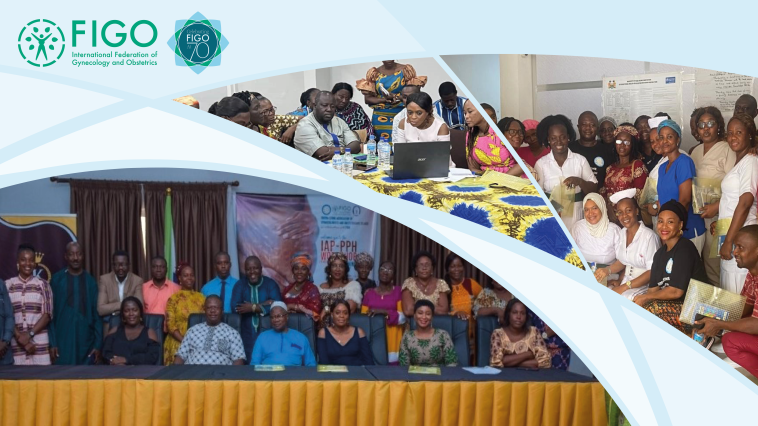FIGO at 70: our collaborative efforts to help prevent postpartum haemorrhage deaths worldwide

As part of the FIGO 70th anniversary celebrations, we revisit some of our crucial work in partnership with member societies to reduce and prevent postpartum haemorrhage (PPH) in their communities. Dr Rossetta Cole tells us about her involvement in the FIGO IAP project and how this initiative helped to improve access to essential medicines to reduce PPH in Sierra Leone.
What led you to collaborate with FIGO initially?
The Sierra Leone Association of Gynaecologists and Obstetricians (SLAGO) had been a FIGO member for a long time, but then it went dormant for over 10 years. FIGO was looking for OBGYNs in Sierra Leona to collaborate with and Dr Gabriel Ganyaglo, a Ghanaian consultant and FIGO Fistula Surgeon working in our country, put them in touch with us. We were a group of young OBGYNs, some of us returning back to Sierra Leone after spending some time abroad. We had a zoom meeting with FIGO representatives about collaborating with the IAP project, and this conversation spurred us to renew our local license and form a new executive board for our national society.
Tell us about your experience of taking part in the FIGO IAP project
It was a great opportunity for a newly reactivated society. This was our first time participating in such an interesting and much-needed project involving the Ministry of Health and other stakeholders to review and update a national protocol.
The task was challenging, as it was difficult at first to balance our regular clinical work with our participation in project. It took determination, focus and being goal-oriented to get it all done. We had several meetings with FIGO colleagues and they gave us a lot a guidance and advice. As the secretary, a lot of pressure was on me to rally round local members to complete the project - but the effort was very much worth it. This collaboration with FIGO helped us relaunch our society in Sierra Leone and gain recognition with the Ministry of Health and other stakeholders.
What were the project’s greatest achievements and successes?
The project was able to successfully complete the review and update of the national PPH guidelines tailored for our country. Knowing how resource-challenged we are as a nation, it is important to note we now have an updated national PPH guidelines, signed and launched by the Ministry of Health and Sanitation.
PPH is the leading cause of maternal mortality in our country. The IAP project gave us the opportunity to deliver PPH training in various facilities and disseminate the new guidelines to all secondary and tertiary hospitals in the country. With the recent update to include heat-stable cabetocin (HSC) in the guidelines, the government is now in the process of procuring HSC from Ferring pharmaceutical.
The impact of the IAP project is long lasting, it has helped foster collaborations to keep delivering more PPH training and simulation, as we continue to educate health care workers in the appropriate use of the lifesaving medications such as HSC.
What are the biggest challenges to combat PPH in the region?
Some of the biggest challenges for us are:
- Unavailability of blood and blood products. There are lots of myths surrounding voluntary blood donation. Even though the number of hospital deliveries have increased and health care workers are knowledgeable about guidelines, there are still maternal deaths occurring due to the unavailability of blood and blood products.
- Delays in referrals from primary health clinics. These delays may be caused unavailability of emergency transportation systems like ambulances, especially in the far villages.
- Poverty still plays significant role.
What would you like to see from FIGO in the next 30 years?
I would love to see more collaborative work with member societies in areas such as reproductive health and family planning initiatives. FIGO should continue to invest in empowering local member societies and developing more and more collaborative initiatives to improve the lives of women, mothers and children.
Join us in celebrating FIGO's 70th anniversary - share your memories with us